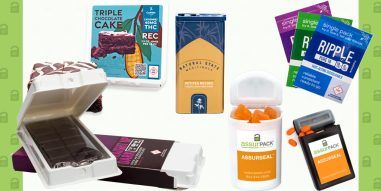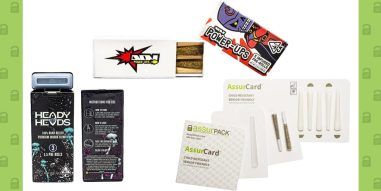The 5 Most Common Cannabis Packaging Questions of 2024
April 10, 2024
As a cannabis packaging company, we make it our business to know your questions about packaging cannabis products and current hot topics surrounding the cannabis industry. We researched trending questions about packaging and decided to share our answers. Whether you are new to the industry or an established business, we strive to keep you informed.
What is Airtight Cannabis Packaging?
Airtight is a term that gets used constantly in cannabis packaging, but it’s a term that people often don’t fully understand. “Airtight” in the context of cannabis packaging is used to convey a rate of vapor transmission. This means that a seal within the packaging helps keep cannabis from drying out by retaining moisture.
At AssurPack®, we ensure airtight packaging with our products tested for USP 671: Tight certification. This tightness rating means that the packaging has the highest ranking for vapor transmission rates, meaning your product degrades at a slower rate. This vapor transmission rate affects the company’s bottom line since it affects how light the products become over time (i.e., an eighth can become 3 grams if the moisture leaves the packaging).
What Exactly Is CPSC Packaging Certification?
The Consumer Product Safety Commission (CPSC) Packaging Certification indicates compliance with standards set for child-resistant packaging. In the context of cannabis, this certification is particularly important as it ensures that cannabis products are packaged in a way that prevents accidental ingestion by children. AssurPack’s packaging solutions are designed to meet these stringent requirements, offering a range of CPSC-certified packaging options. These packages are tested rigorously to ensure they are difficult for children to open while remaining accessible to adults, especially those with disabilities or reduced hand strength.
What is Tamper-Evident Packaging?
Tamper-evident packaging indicates if a package has been opened or tampered with. This feature is crucial for ensuring the safety and integrity of cannabis products for consumers. AssurPack® offers tamper-evident packaging solutions, including shrink bands, labels, blister packs, and tapes. This type of packaging reassures consumers about the untouched and safe nature of the product, enhancing trust in the brand and complying with various state regulations that mandate tamper-evident packaging for cannabis products.
How can my company customize our cannabis packaging?
Customization of cannabis packaging is key to establishing brand identity and differentiating products in the market. AssurPack® provides a variety of customization options for cannabis packaging. Companies can choose from different label materials, shapes, sizes, and printing options to create a unique look that aligns with your brand. This includes using specific colors, logos, and other branding elements.
The AssurPack® team works closely with clients to understand their branding needs and provide packaging solutions that are not only compliant with regulations but also visually appealing and reflective of the brand’s ethos. These solutions can range from subtle branding elements to bold, innovative designs and secondary packaging that capture attention and convey the brand’s message effectively.
Is Plastic Packaging Sustainable?
Nowadays, everyone wants fully sustainable packaging made of hemp or removed from plastics altogether. While this is an admirable and ambitious goal, it doesn’t fit the needs of the cannabis industry in total. Aside from glass, plastic is the most ideal form of packaging for cannabis because it helps to keep it safe, preserve cannabinoids and terpenes, and keep cannabis products in the best condition possible while on store shelves.
AssurPack® understands that plastic has its fair share of challenges, and we’ve worked to take steps to counteract plastic’s harm to our environment. More recently, we’ve introduced Post-Consumer Resin to our packaging, with all packaging having a minimum of 25% PCR in it and customers able to have up to 100% of their packaging made by PCR.
Contact us for a free consultation to select your best packaging options and free samples.




